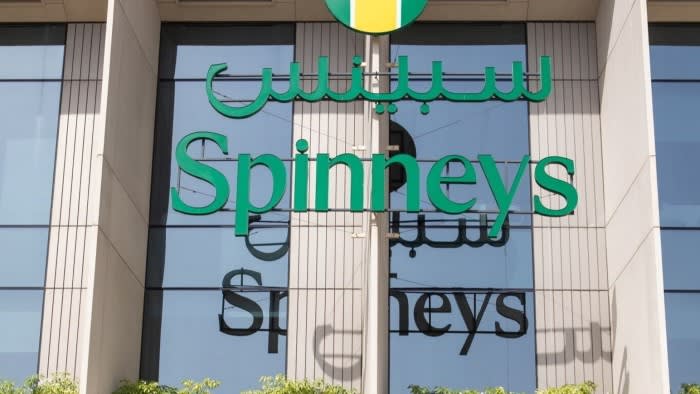Stay informed with free updates
Simply sign up to the Retail & Consumer industry myFT Digest — delivered directly to your inbox.
Spinneys, the high-end grocer that operates the Waitrose brand in the Gulf, rose as much as 10 per cent on its first day of trading on Thursday — the latest major private company to go public in Dubai and part of what bankers and investors hope could be a wave of such listings.
The company — named after British army officer turned merchant Arthur Rawdon Spinney, who began importing food into British-occupied Egypt a century ago — said its offering was 64 times oversubscribed and priced at the top end of the range. The shares were later trading up 5 per cent on the day.
Bankers say the listing has been closely watched by executives considering launching their own offerings. They believe its success may encourage other private sector companies to come to market in the Middle East’s financial hub Dubai, whose stock exchange has traditionally been dominated by state-linked companies.
Spinneys’ flotation “will hopefully engage other entrepreneurs and families to follow this trend” for large, family-owned businesses to come to market, said Ali Khalpey, Dubai-based head of equity capital markets syndicate at EFG Hermes.
Privately held schools group Taaleem listed in Dubai in 2022 and Al Ansari Financial Services made its market debut in 2023, the first such listings for years.
Gulf supermarket operator LuLu Group has also said it is planning an IPO in the region, without specifying on which exchange.
Previously, IPOs have been dominated by government-owned companies. Parking operator Parkin listed earlier this year, the most recent state-owned company to do so, while several larger state entities — including Dubai utilities group DEWA — floated in 2022.
“We first saw a lot of government-related entities, that was to deepen the stock market and get more flow,” said Monika Malik, chief economist at Abu Dhabi Commercial Bank. “A natural progression of that would be to get more private sector companies coming in.”
Five flotations raised $8.5bn in 2022 in what was a strong year for Dubai IPOs, according to Dealogic data. However, last year there were just two IPOs raising $525mn.
Both Dubai and Abu Dhabi are pursuing ambitious economic plans as the former tries to expand its economy beyond trade and tourism and the latter looks to diversify away from oil. Both have their own bourses, and are trying to increase the number of listed companies in their capital markets in order to attract investors.
Spinneys, which is majority owned by the Al Bwardy family, priced at Dh1.53 per share and raised Dh1.4bn ($375mn), giving the retailer an implied market capitalisation before trading began of Dh5.5bn ($1.5bn).
Analysts say the narrow range of stocks listed in Dubai has helped boost demand for the shares.
“Even though people liked the macro economic picture [in the UAE], apart from the banking sector there were limited ways to play the growth story, the outlook and diversification plans,” added Malik. “A company like Spinneys is a way to bet on population growth.”
Asset manager Franklin Templeton is a cornerstone investor in the IPO, alongside Abu Dhabi investment group Emirates International Investment Company.
Spinneys opened its first shop in Dubai in 1961, just as oil discoveries in the United Arab Emirates were opening the petrodollar floodgates, creating enormous wealth and attracting legions of foreign workers.
Today its 75 stores — including those operating under the banner of UK supermarket chain Waitrose — cater mainly to expatriates and wealthy shoppers in the UAE and Oman. The company made revenues of Dh2.9bn in 2023, up 9 per cent from Dh2.6bn the previous year. It made a pre-tax profit of Dh256mn in 2023 and Dh215mn in 2022.
To boost growth the company is turning to Saudi Arabia, with plans to open its first store in the region’s biggest economy this year, but none under the Waitrose banner, according to chief executive Sunil Kumar.
John Lewis-owned Waitrose “don’t want to go further than the UAE”, he said. “The partnership board is not keen until and unless the Saudi market opens up to the new liberal way of John Lewis Partnership.
“There is no liquor permitted in Saudi Arabia. So there is a restriction. There is no pork,” he added.
However, Waitrose told the Financial Times that the decision not to expand into Saudi Arabia was not related to prohibited items. Instead, it said it was focused on a £1bn expansion in the UK. “There are logistical challenges of getting into any new market on a significant scale, which aren’t right for us at the moment,” the company added.


